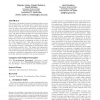Free Online Productivity Tools
i2Speak
i2Symbol
i2OCR
iTex2Img
iWeb2Print
iWeb2Shot
i2Type
iPdf2Split
iPdf2Merge
i2Bopomofo
i2Arabic
i2Style
i2Image
i2PDF
iLatex2Rtf
Sci2ools
103
click to vote
EMSOFT
2005
Springer
2005
Springer
Using de-optimization to re-optimize code
The nature of embedded systems development places a great deal of importance on meeting strict requirements in areas such as static code size, power consumption, and execution time. In order to meet these requirements, embedded developers frequently generate and tune assembly code for applications by hand, despite the disadvantages of coding at a low level. The phase ordering problem is a well-known problem affecting the design of optimizing compilers. Hand-tuned code is susceptible to an analogous problem to phase ordering due to the process of iterative refinement, but there has been little research in mitigating its effect on the quality of the generated code. This paper presents an extension of the VISTA framework for investigating the effect and potential benefit of performing de-optimization before re-optimizing assembly code. The design and implementation of algorithms for de-optimization of both loop-invariant code motion and register allocation, along with results of exp...
| Added | 27 Jun 2010 |
| Updated | 27 Jun 2010 |
| Type | Conference |
| Year | 2005 |
| Where | EMSOFT |
| Authors | Stephen Hines, Prasad Kulkarni, David B. Whalley, Jack W. Davidson |
Comments (0)

